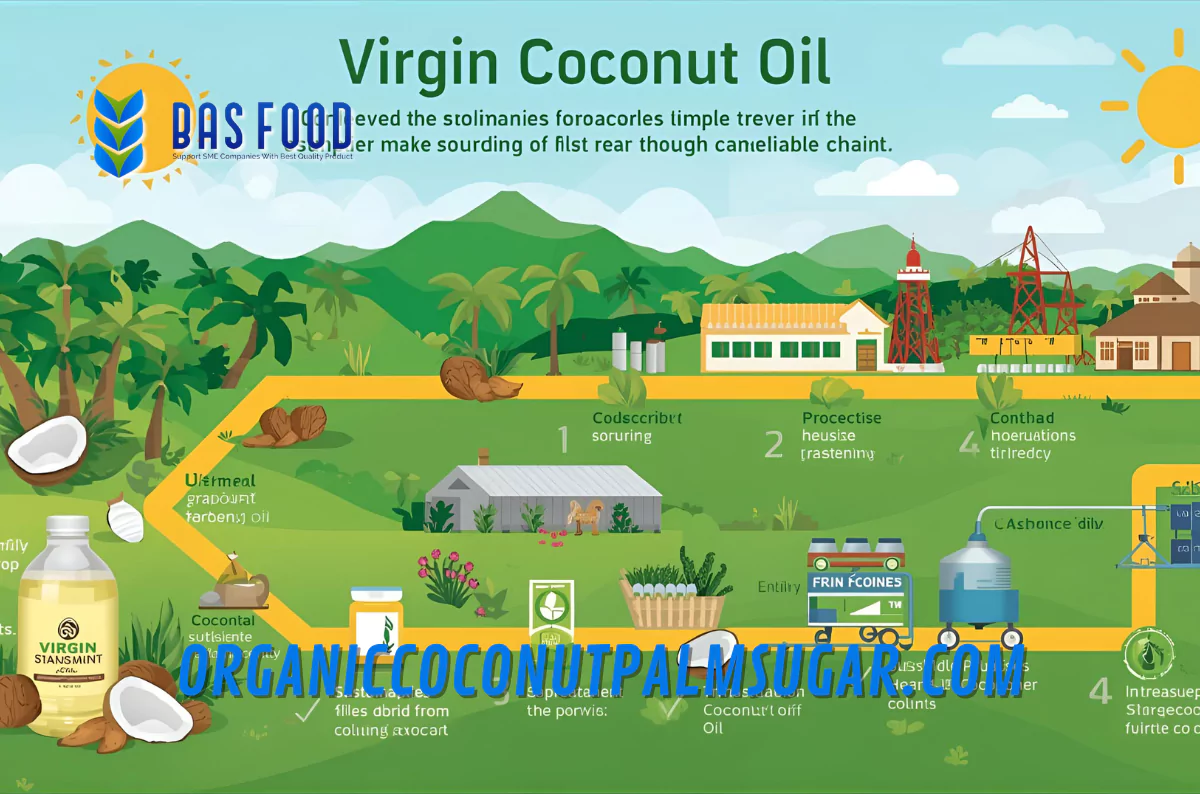Virgin Coconut Oil (VCO) has become one of the most sought-after natural products in recent years. From the food industry to cosmetics and wellness, its demand continues to rise. Yet, behind every bottle of VCO is a fascinating and complex process known as the VCO supply chain.
This supply chain is not just about production—it tells a bigger story. It connects smallholder farmers, local processors, international traders, and global consumers who value purity, sustainability, and fair practices. Understanding how VCO travels from fresh coconuts to finished products helps businesses, consumers, and suppliers make informed choices.

Coconut Oil Sourcing: The First Step in the VCO Supply Chain
At the heart of the VCO supply chain lies coconut oil sourcing. Farmers harvest mature coconuts, usually between 11 and 12 months old, when the oil content is at its peak. These coconuts are then carefully selected for processing into high-quality VCO.
Sourcing is not just about quantity—it is about quality and sustainability. Farmers in tropical regions such as Indonesia, the Philippines, and Sri Lanka are the backbone of the industry. Their practices determine whether the final product meets international standards. As more global buyers prioritize traceability, sourcing directly from trusted smallholder farms has become a major advantage.
Processing and Extraction: Where Coconuts Become VCO
After sourcing, the next crucial step in the VCO supply chain is processing. The extraction of Virgin Coconut Oil is different from regular coconut oil because it uses fresh coconut meat instead of dried copra. This process preserves the oil’s natural antioxidants and nutrients.
Common methods include cold pressing, fermentation, and centrifuge extraction. Each method has its own benefits, but cold pressing is often favored for its ability to retain aroma and nutritional value. At this stage, factors such as hygiene, temperature control, and equipment quality can significantly impact the outcome. Sustainable producers ensure minimal waste by using coconut husks, shells, and water for secondary products.
Fair Trade Coconut Oil: Empowering Farmers and Communities
One of the biggest conversations around the VCO supply chain is fairness. Many coconut farmers operate in remote areas and often face challenges like fluctuating prices, limited access to markets, and lack of bargaining power. This is where fair trade coconut oil comes in.
Fair trade initiatives ensure farmers receive a fair wage and work under safe conditions. By cutting out exploitative middlemen, these programs give more value to the producers themselves. Consumers who choose fair trade coconut oil are not just buying a product—they are investing in farmer welfare, education, and community development.
Sustainable VCO: Protecting Nature While Meeting Demand
As global demand increases, sustainability has become a key theme in the VCO supply chain. Sustainable VCO practices prioritize eco-friendly farming, reduced chemical use, and long-term soil health. They also include efficient water use and waste reduction during processing.
For many buyers, sustainability is no longer optional—it is essential. Retailers and manufacturers want to ensure that the coconuts they source do not contribute to deforestation or harm local ecosystems. As a result, suppliers who can provide certified sustainable VCO have a strong advantage in international trade.
Distribution and Export: How VCO Reaches the World
The journey of VCO does not stop at local processing facilities. Distribution and export play an equally important role in the VCO supply chain. Exporters must handle logistics, certifications, quality inspections, and packaging that meets international standards.
Countries like Indonesia are among the world’s largest exporters of VCO. Their strategic locations and abundant coconut plantations make them reliable sources for global buyers. Export processes also highlight the importance of traceability, ensuring that every shipment meets buyer requirements. Trusted exporters maintain transparency to build long-term business relationships.
CV Bonafide Anugerah Sentosa: A Trusted Coconut and Spices Supplier
When discussing reliable suppliers in the VCO supply chain, one name stands out: CV Bonafide Anugerah Sentosa. Based in Indonesia, the company has built a reputation as a trusted supplier of coconut products, including Virgin Coconut Oil, as well as a wide range of spices and fishery goods.
Their commitment goes beyond business. CV Bonafide Anugerah Sentosa supports sustainable coconut oil sourcing and ensures that products meet global quality standards. With a focus on fair trade and long-term partnerships, the company serves as a bridge between local farmers and international buyers who value ethical sourcing.
Future Trends in the VCO Supply Chain
The VCO industry continues to evolve. Consumers are becoming more conscious of where their products come from, pushing suppliers to prioritize sustainability and transparency. Certifications such as organic, fair trade, and ISO compliance are becoming standard rather than optional.
In addition, technology is playing a bigger role. From blockchain tracking to advanced extraction methods, the VCO supply chain is adapting to meet future challenges. For buyers and businesses, staying informed about these shifts will help them remain competitive in the global market.
Conclusion: The Story Behind Every Bottle of VCO
The VCO supply chain is more than a production cycle—it is a network of people, practices, and principles that shape one of the world’s most versatile oils. From coconut oil sourcing to fair trade coconut oil and sustainable VCO, every step matters in ensuring quality and fairness.
For businesses and consumers alike, knowing the origins of VCO helps make better choices. And with suppliers like CV Bonafide Anugerah Sentosa, buyers gain not only reliable products but also a trusted partner in building a more sustainable and ethical future.
Contact CV Bonafide Anugerah Sentosa how we can provide the best solutions for you. WhatsApp: +62 8213 4505 737, Email: info@bonafideanugerahsentosa.com / bas.mdir@gmail.com.

